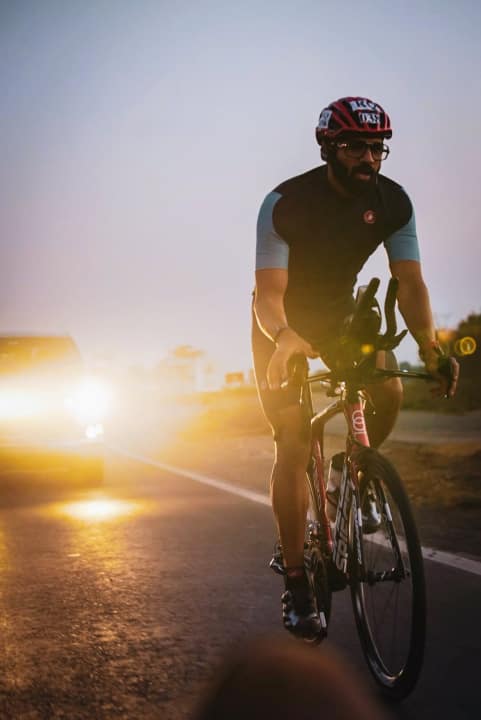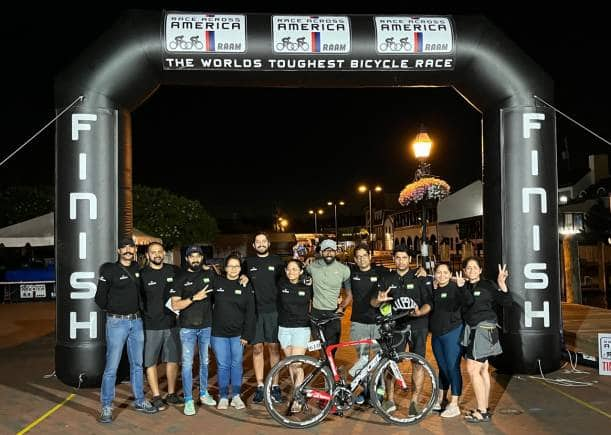



In late June, Mumbai-based lawyer Kabir Rachure became the first Asian in the solo male under 50 years category to finish on the podium at the Race Across America (RAAM), and the only Indian to complete the ultra-endurance event on two occasions.
The 40-year-old event is billed as the world’s toughest bicycle race, and justifiably so. Participants ride across the US, from San Diego on the west coast to Annapolis, Maryland, on the east coast, covering 4,828 km. The cut-off time for solo racers, the stars of RAAM, is 12 days. Riders aim to cover over 400 km daily, enduring heat, rain, wind and hail, as they negotiate mountain ranges and deserts, sleeping for just about an hour or two every day and spending over 18 hours on the saddle. (RAAM is not raced in stages, and the clock never stops ticking for the duration of the race.)
 Kabir Rachure completed the race in 11 days, 11 hours, and 25 minutes.
Kabir Rachure completed the race in 11 days, 11 hours, and 25 minutes.
Rachure’s 10-member support crew for the race included his sister Sapna and close friends such as Rutvik Khare, whose company, Inspire India Sport Management, organises RAAM qualifiers in the country. The 31-year-old used four bicycles at the RAAM – the Spiegel San Marino, Diablo, Lapierre Aircode SL 600 and Pulsium SL 600.
Rachure, who finished in 11 days, 11 hours, and 25 minutes, spoke to Moneycontrol about how he prepared for the race, the most gruelling stages he encountered, and putting mind over matter. Edited excerpts from the interview:
On being RAAM-ready: The thing with an event like RAAM is you never really feel that you are ready for it. You simply have to put in a lot of effort, have faith in yourself, and go for it. After I participated in the Ultra Spice Race in 2019 (a 1,750 km Goa-Ooty-Goa RAAM qualifier), I thought I should give the RAAM a go.
The toughest stretch: Arizona posed major problems in 2019, when I made my first attempt (Rachure completed the race in 11 days, 22 hours, and 43 minutes). The temperatures were searing and touched about 56 degrees Celsius. This time, though, it was Kansas that was a killer. I rode for about 36 hours in the state and encountered strong headwinds and crosswinds most of the time. But if there’s something I learnt from the 2019 race, it is that nothing is permanent. Headwinds are eventually replaced by tailwinds; heat gives way to cold; everything is a phase that you have to endure—and you simply lower your head and ride. That’s where putting mind over matter helps. That’s because your mind gives up a lot faster than your body, so, I just blank out and ask my mind to shut up. That works for me. Plus, you use visualisation to prepare. You know what the terrain and conditions will be like, you anticipate challenges, and prepare for them mentally, so, when they finally arrive, you are prepared.
Eating on the saddle: I keep my diet simple, which mostly means home-cooked food. During the race, just before I would sleep, I’d mostly have moong-dal khichdi, which my sister would make. That constituted my one proper meal for the day. Other stuff which I consumed included energy drinks, Red Bull, cold coffee, lots of chips, Subway sandwiches, lemonade, blueberries and blackberries.

Non-stop training: When you are an ultra-distance cyclist, the training never stops. In November, I’ll be competing in the 6-12-24 World Time Trial Championships in Borrego Springs, California. Training is a daily process, both physically and mentally. You learn from your previous races and you strategise. The physical training starts about six months prior to the actual race. That usually means weekly rides of around 12 hours: four to six-hour rides every weekend and daily rides of anywhere between one to two hours. After about two to three months, the volume of the rides goes down, but the intensity increases. I like to compare the process to the making of a sword. You make the sword in the first three months, then sharpen the tool for about two months, and the last two weeks are spent polishing it. That is what we call the taper period when both volume and intensity go down, because you need your body to be capable of peak performance.
Crossing the finish line: To be honest, I felt kind of empty. Being on the road for over 10 days is immensely tough, but you learn to enjoy that process, the teamwork that keeps you on the road, the whole flow of it. But even that doesn’t last long, because you are thinking about how you can improve in your next races. I was also relieved that I could finally sleep—for eight, 10, however many hours I wanted to—or simply sit around with the crew and chat.
Discover the latest Business News, Sensex, and Nifty updates. Obtain Personal Finance insights, tax queries, and expert opinions on Moneycontrol or download the Moneycontrol App to stay updated!
Find the best of Al News in one place, specially curated for you every weekend.
Stay on top of the latest tech trends and biggest startup news.